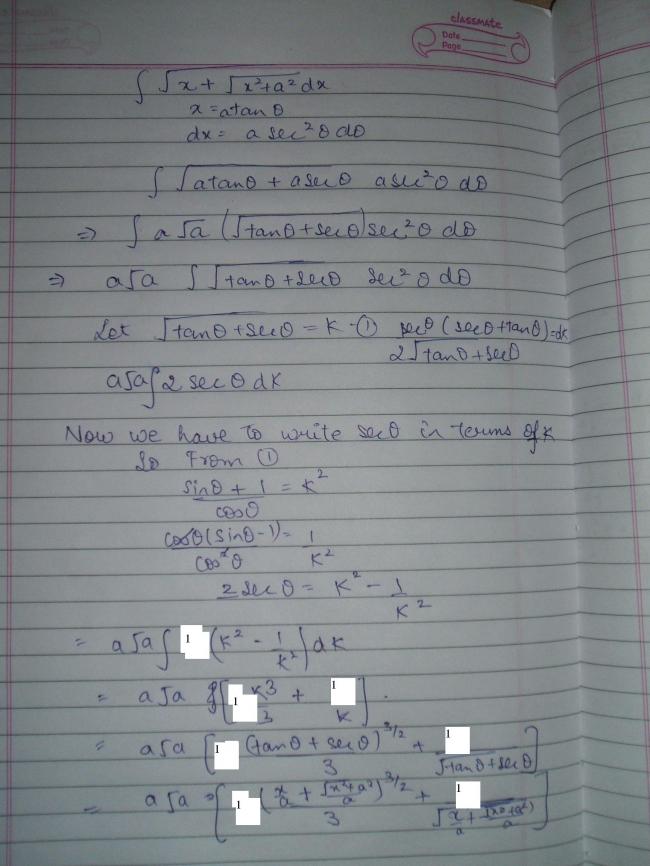80]\int {\frac{1}{{x + \sqrt {x^2 - x + 1} }}} dx
this thread is only for integration sums............
AND YA FORGOT TO TELL ALL TARGETIT USERS, I HAVE COPIED ALL THESE SUMS. SO KISIKO GAALI DENA HAIN YA KUCH KEHNA HAIN, PLEASE VISIT
http://targetiit.com/profile711.html AND POST THEM IN CHATBOX. THANKS IN ADVANCE............
1}\int_{0}^{1}e^{\sqrt{e^{x}}}\ dx+2\int_{e}^{e^{\sqrt{e}}}\ln (\ln x)\ dx
2} \int \frac{x^{3}}{(x-1)^{3}(x-2)}\ dx
3}1985 japan women university
\lim_{a\rightarrow + \infty} \frac {\int_0^a \sin ^ 4 x\ dx}{a}
4} \frac{1}{\displaystyle \int _0^{\frac{\pi}{2}} \cos ^{2006}x \cdot \sin 2008 x\ dx}
5} \int_0^{\frac {\pi}{2}} \frac {x^2}{(\cos x + x\sin x)^2}\ dx
6} IF F(X)= x2 + |x| then prove that
\int_{0}^{\pi}f(\cos x)\ dx=2\int_{0}^{\frac{\pi}{2}}f(\sin x)\ dx
7}Evaluate the following definite integral.
\int_{e^{2}}^{e^{3}}\frac {\ln x\cdot\ln (x\ln x)\cdot\ln\{x\ln (x\ln x)\} + \ln x + 1}{\ln x\cdot\ln (x\ln x)}\ dx
8}
Let f a nonnegative ,continuous and periodical function defined on the reals, such that the arithmetic mean of the numbers f(1), f(2),...f(n) tends to zero when n tends to infinity. Prove that f(k)=0 for any natural number k.
9}\int_{0}^{1}\frac {x\ dx}{(x^{2} + x + 1)^{\frac {3}{2}}}
10}\int_{2}^{6}\ln\frac { - 1 + \sqrt {1 + 4x}}{2}\ dx
-
UP 0 DOWN 0 23 174

174 Answers
in Q81 what we have to solve 4 ???
srry 4 this question
but this is a 2nd order D.E
so i know this much that
\frac{\partial y\frac{\partial y}{\partial x}}{\partial x}=c-(\frac{\partial y}{\partial x})^{2}
wat can do of it ???
no guy or gal interested in dis topic
try dese they will prove to be useful[1]
umm....can anyone who has tym plz solve questn number 32..
am having a bit trouble with that one.
thanks
a different approach for 9th
\int\frac{x}{\left ( x^2+x+1 \right )^{\frac{3}{2}}}dx
\int\frac{x}{\left ( x^2+x+1 +\frac{1}{4}-\frac{1}{4} \right )^{\frac{3}{2}}}dx
\int\frac{x}{\left ( x^2+x+\frac{1}{4}+\frac{3}{4} \right )^{\frac{3}{2}}}dx
\int\frac{x}{\left ( (x+\frac{1}{2})^2+\frac{3}{4} \right )^{\frac{3}{2}}}dx
let\, \, \,x+ \frac{1}{2} = \frac{\sqrt{3}}{2}tan\alpha \rightarrow dx= \frac{\sqrt{3}}{2}sec^2\alpha. d\alpha
\int \frac{\frac{1}{2}\left ( \sqrt{3} tan\alpha -1\right )\frac{\sqrt{3}}{2}sec^2\alpha d\alpha }{\left ( \frac{3}{4} (1+tan^2\alpha )\right )^{\frac{3}{2}}}
\int \frac{\frac{\sqrt{3}}{4}\left ( \sqrt{3}tan\alpha -1\right ).sec^2\alpha d\alpha }{\frac{3.\sqrt{3}}{2^3}.sec^3\alpha }
\frac{2}{3}\int{\left ( \sqrt{3}tan\alpha -1\right ).cos\alpha d\alpha }
\frac{2}{3}\int{\left ( \sqrt{3}tan\alpha.cos\alpha -cos\alpha \right )d\alpha }
\frac{2}{3}\int{\left ( \sqrt3{sin\alpha } -cos\alpha \right )d\alpha }
which can be done ....
46.
ans: 1/(b+1)
f(b)= ∫(x^b)-1)/ln x dx
f'(b)=∫(x^b ln x)/ln x dx= x^ b ,treating x as constant
:
f(b)= x^(b+1)/(b+1) ,put the limits
:
f(b)= 1/b+1
sorry the ans is : ln(b+1)
f(b)=∫(x^b -1)/ln x dx
f'(b)=x^b ln x/ln x dx ,treating x as constant
:
f'(b)=x^(b+1)/(b+1) ,putting the limits
:
:
f"(b)+1/b+1;
f(b)= ln(b+1)
